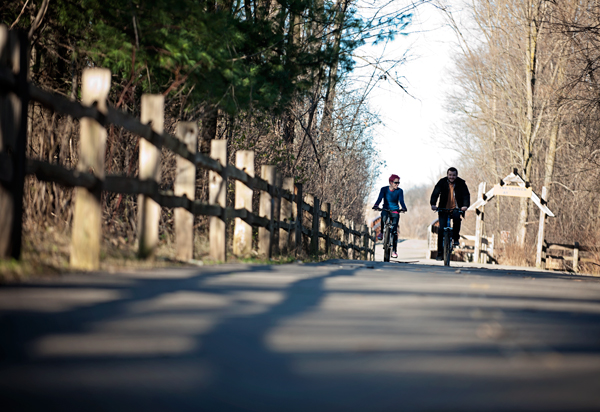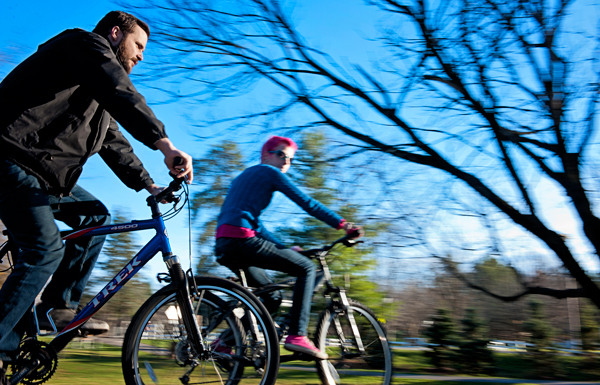Room for trails grow as Southwest Michigan goes on a road diet
Communities that want to learn how they can become more friendly for bicycle riders are participating in a statewide program known as Training Wheels. Southwest Michigan cities that have participated say the program is comprehensive and has gotten the results hoped for. Zinta Aistars reports.
Cynthia Krupp started thinking about how to make Michigan communities safer and more inviting for cyclists when she took a bicycle safety class to improve her own biking skills. As transportation planner for the Intermodal Policy Division at Michigan’s Department of Transportation (MDOT) in Lansing, the good planning behind good trails rank at a level of high importance to her.
“The bicycling class made me more aware of safety issues involved with good bike trails,” Krupp says. “MDOT had started walkability audits in 2004, but we’d done nothing yet for bikes.”
Krupp’s idea was to do similar audits for bike trails throughout the state, a few communities at a time, and to do so by putting engineers, city leaders and public officials on bikes, letting them experience the cyclist’s perspective.
“First, we had to educate our own (at MDOT), then we started to reach out to communities,” Krupp says.
MDOT now sponsors a program called Training Wheels, started in 2005, a course offered around the state designed to educate communities interested in providing on-road bicycle facilities for their residents and visitors. The course includes two hours of classroom instruction followed by an on-road, on-bike portion. By 2013, several Southwest Michigan communities had signed up for their turn, with nearly 100 such audits already done statewide.
Training Wheels is based on the national guidelines included in the American Association of State Highway Transportation Official (AASHTO) Guide for the Development of Bicycle Facilities, says Krupp. These guidelines are used by civil engineers to determine specifications for sidewalks, the width of bike trails, signage, and other similar guideposts to safe riding.
“During the on-bike portion of Training Wheels we ride through the community, analyzing what types of on-road facilities are available,” says Krupp. “We make many stops along the way to point out potential facility types, looking at intersections, at the types of trails and how safe they are for bicyclists. We follow the bike ride by a group exercise and discussion, questions from participants and a brief wrap-up.”
Keith Baker, community services director and assistant city manager in Coldwater, was one of those who signed up for the program. Last June, he and 22 others participated in the Training Wheels course and went for a ride.
“We were one of five communities selected by MDOT per year for the course,” Baker says. “Once you are selected, nearby communities can join in, too, so we had representatives from towns like Quincy, Marshall, Sturgis and others attend with us. It’s a free program, but the hosting city has to take care of the logistics and making accommodations.”
Coldwater government and public officials, says Baker, met over the summer to put together a plan they call the Community Visioning Process. “One thing coming out of that meeting was that our community wants to make Coldwater more suitable for bike riding.”
As a result of the Training Wheels program, Baker says, the city will be undergoing a “road diet.” That is, the four-lane highway cutting through the city will be turned into a three-lane road.
“The width of the fourth lane will be divided on each side as a bike trail,” Baker says. “As we do regular road maintenance over the next five to ten years, it will be a good time to repave and reconstruct the roads for bike trails.”
Alongside Coldwater officials, Niles city officials participated in the Training Wheels course as well. Richard Huff, city administrator in Niles, found the course to be “informative and eye-opening. The program was considerably more comprehensive than I expected it to be. We discussed current trends regarding differing age groups and their use of cycles for transportation and recreation and the benefits of a comprehensive approach to cycle transportation including well-marked trails, roadways, and paths leading to recreation areas and commercial and retail districts.
“The presenters were engineers from Chicago with a wealth of information about their initiative on bicycle transportation and bicycle use on downtown roadways. After a thorough discussion on bicycle use, we went on a riding audit of our town. It appears we could easily incorporate bicycle transportation into our city on most roadways.”
“There were really no new surprises about the trail system for me,” Huff says. “I have used the trail since its construction and was already quite familiar with it. I do believe we are on the verge of a very important addition to the trail system with Niles Township constructing trail to the state line. I want to incorporate bicycle transportation into future road construction and reconstruction and provide marked bicycle lanes when repainting our roads.”
While Coldwater has yet to do a survey of bikers and walkers in the area, Niles completed one in 2007 to 2008.
“It was a city-wide survey asking our citizens to rate many activities in the city,” says Huff. “Parks and trails were at the top of the list. Since that time we have built parks and trails that are extensively used by city residents and our neighbors.”
“Improving bike and walking trails, when done well, is really an asset to a community,” says Cynthia Krupp. “We see health benefits to the community. We see green benefits, and economic benefits. When people ride bikes, they are more inclined to stop in at local businesses. And walkers bring vibrancy to a town.”
Too many streets and roads in Michigan communities are overbuilt, says Krupp. Bike and walking trail audits were first done in Kalamazoo, Ann Arbor, Grayling and Lansing, she says, and MDOT has returned to some of these areas, such as Kalamazoo and Lansing, for second audits and also to showcase trails done well.
“Sometimes you don’t need a big fix,” she says. “You can stripe a parking area differently. We’ve found that just planting trees along the sides of a road will slow traffic down. Or to put parking on one side. That’s the low-hanging fruit. Bigger projects require planning and construction. We look for communities that are ready to embrace this kind of change and understand how trails can improve their community. Then we encourage partnering with others in the community to make it happen.”
Zinta Aistars is creative director for Z Word, LLC, and editor of the literary magazine, The Smoking Poet. She lives on a farm in Hopkins.


















